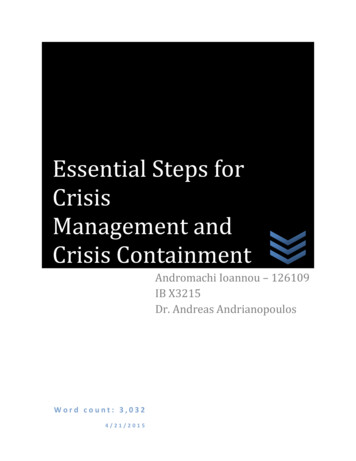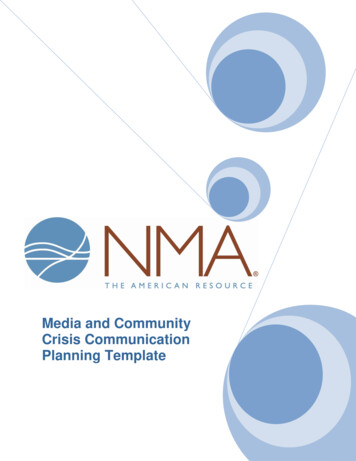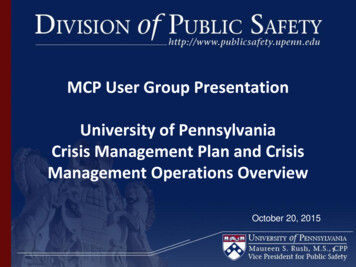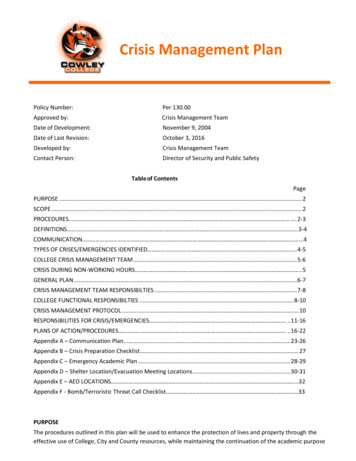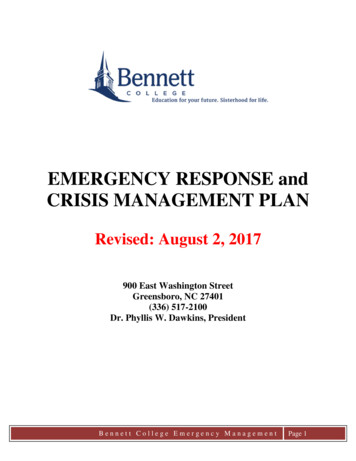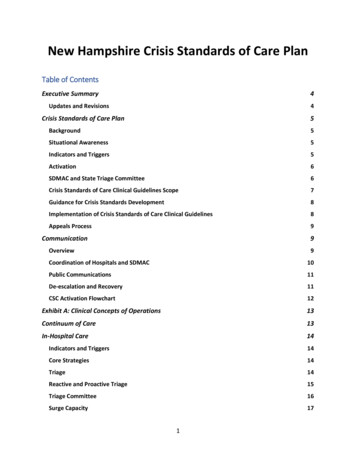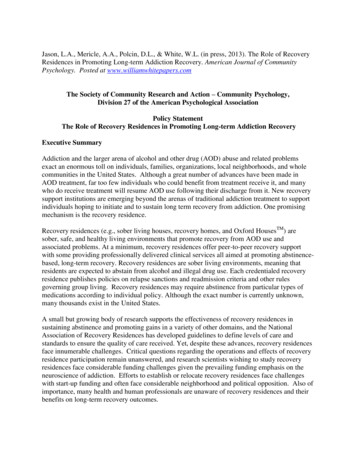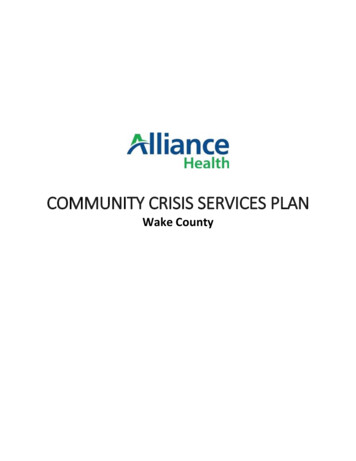
Transcription
COMMUNITY CRISIS SERVICES PLANWake County
ContentsIntroduction . 2Why a county-specific community crisis services plan? . 2Brief summary of Involuntary Commitment (IVC) law revisions . 2Wake County Community Crisis Services Plan . 3Crisis collaborative & stakeholders who developed the plan . 3Wake County Crisis Services . 4Involuntary Commitment Process . 4County Transportation Agreement . 5List of Facilities (first examination health screening tool) . 5Approved and recommended training for IVC responders/transporters . 6Community Crisis Services Plan Wake CountyEffective date: October 1, 20191
IntroductionWhy a county-specific community crisis services plan?Session Law 2018-33 (SB630) represents a significant revisions to North Carolina’s InvoluntaryCommitment (IVC) law. The most recent revised bill put into effect the requirement for everyLME/MCO to develop local area crisis services plans. Alliance Health covers four single counties,each with unique strengths, challenges and needs. Each of the four counties in the AllianceHealth catchment area has its own local area or community crisis services plan.Wake has been at the forefront in North Carolina in regards to developing and organizing acommunity crisis system. Wake opened its 24/7/365 Crisis and Assessment center in 1993,providing a combination of 24/7 STR, phone and walk-in crisis assessment, involuntarycommitment evaluations, 23 hour observation, and the centralized "drop-off site" for police CITofficers. Wake County expanded crisis services in 2010 with the construction of the WakeBrookcampus, which included expansion of inpatient psychiatric services, facility-based crisis, andnon-hospital detoxification as well as relocation of the Wake Crisis and Assessment unit. Wakewas also one of the first communities to develop a local crisis collaborative, inclusive ofcommunity stakeholders, looking to improve behavioral health crisis services and reduce theunnecessary use of the local emergency departments. Over the years the landscape of crisisservices in Wake has evolved and expanded, consisting of an array of services delivered withinthe community. Mobile Crisis Management services are delivered by a team of mental healthprofessionals through Therapeutic Alternatives. For individuals experiencing non-emergentbehavioral health issues, Monarch operates a Behavioral Health Urgent Care that accepts walkins. UNC Healthcare assumed operations of the WakeBrook crisis campus in 2012 and providesan array of crisis services on through its Crisis and Assessment Services, 28-bed inpatientpsychiatric unit, Facility Based Crisis and Detox Services.Brief summary of Involuntary Commitment (IVC) law revisionsIVC Laws provide for custody, transportation and evaluations for individuals identified aspotentially having a mental illness or substance use disorder that may be a danger tothemselves or others.IVC also allows an individual found to be a danger to themselves or others to be remanded intothe custody of a facility that provides treatment for mental illness or substance use when thatindividual does not voluntarily seek treatment.Community Crisis Services Plan Wake CountyEffective date: October 1, 20192
Wake County Community Crisis Services PlanAccording to revised Senate Bill 630, every LME/MCO shall adopt a community crisis servicesplan to facilitate first examinations in conjunction with a health screening at the same location.This plan shall be comprised of separate “local area crisis services plans,” for each of the localareas or regions within the catchment area (local areas/regions defined by LME/MCOs).Alliance Health developed the local area crisis services plan in coordination with the countycrisis collaborative groups that were already meeting regularly. Each county crisis collaborativeis comprised of members from various agencies and organizations, including law enforcementand other first responders, connected to the crisis services continuum.Crisis collaborative & stakeholders who developed the planThe Wake County crisis collaborative group meets monthly to discuss strategies to reduce thenumber of mental health and substance use crises, reduce inappropriate utilization of the localemergency departments and to provide a space to share data and brainstorm opportunities toimprove the quantity and quality of crisis services in Wake County. The stakeholder group iscomprised of members who represent the following:--Local Hospitalso Duke Raleigh Hospitalo UNC Rex Hospitalo WakeMed Health & HospitalMonarchNAMI of Wake CountyTherapeutic AlternativesUNC WakeBrook Crisis & Assessment, Facility Based CrisisWake County Emergency Medical ServicesWake County Manager’s OfficeWake County Magistrate’s OfficeLocal Law EnforcementAlliance HealthRepresentatives of the Standard Plans were also invited to provide input and will receive a finalcopy of this plan. The Wake Chief Magistrate provided the following statement regarding aneffective communication process within the county. “One system that has been working really wellwhen it is a clinician initiated petition is having the Custody Order faxed directly to the facility where therespondent is located, which saves law enforcement time and also gets the commitment order overfaster. “ This practice will be continued.Community Crisis Services Plan Wake CountyEffective date: October 1, 20193
Wake County Crisis ServicesThe following serves as a list of the current crisis service providers in Wake County. Theproviders listed deliver specific services related to each category of the crisis continuum. 24-Hour crisis telephone lineo Alliance Health Access Call CenterWalk-in crisis services:o Monarch Behavioral Health Urgent Careo WakeBrook Crisis and Assessmento Holly Hill Respondo Triangle Springs HospitalMobile crisis outreacho Therapeutic Alternatives MCMo Enhanced Mobile Crisis/Advanced Para-medicine teamo Advanced Para-medicine ED diversionCrisis respite/residential serviceso Lutheran Family Services child respiteo Methodist Home for Children and Access Family Services Rapid Response BedsCrisis stabilization units/facilitieso 23-Hour beds: UNC WakeBrooko Facility Based Crisis UNC WakeBrooko Detox Services: UNC WakeBrookInvoluntary Commitment ProcessCommunity Crisis Services Plan Wake CountyEffective date: October 1, 20194
NC Involuntary Commitment Process (IVC): Inpatient Treatment Individual shows signs/symptoms (Psychiatric or Substance Use) that indicate potential danger to self or othersLayperson PetitionClinician PetitionEmergency PetitionCommitment Examiner completes exam form &emergency certificate (1st exam), submits toclerk of court for 24-hr. facility & local officer(used when immediate hospitalization isrequired; bypasses magistrate)Layperson completespetition in front ofmagistrateMagistrate reviewspetitionCommitment Examiner completespetition& exam form (1st EXAM),then faxes to magistrateMagistrate issuescustody orderMagistratedeniespetitionMagistrateissues custodyorderDistrict court judge reviewsemergency sportsindividual*1st EXAM by CommitmentExaminer (ED or Other Site)**(within 24 hours of custody order)Individual arrives at 24-hour facility2nd EXAM** (w/in 24 hours of arrival)Determinednot to meetcriteria Judge orders OutpatientCommitment**Hearing in front of District Judge(within 10 days of custody order)Judge orders Substance UseCommitmentJudge orders further InpatientCommitmentDistrictJudgedeniespetition Determinednot to meetcriteria Judge ordersreleaseBased on Information from Criteria for Involuntary Commitment in NC (Mark Botts, 2009, UNC School of Government); Commitment Issues for Law Enforcement (NCAG, 2014); and SB630 IVC Revisions(2018). * Officer must take the individual into custody within 24 hours or new order needed.**If individual is found in need of Involuntary Outpatient Psychiatric or Substance Use Treatment, theprovider will be identified and the individual will be released from custody; returned to residence after 1 st Exam. If determined not to meet IVC criteria, individual is released and proceedings areterminated. ); Individual can, at any time, elect to have voluntary treatment. If voluntary, law enforcement will not transport.County Transportation AgreementThe Wake County involuntary commitment transportation agreement adopted pursuant to G.S.122C-251(g) which identifies the law enforcement officers, designees under G.S. 122C-251(g),or individuals or entities otherwise required to provide custody and transportation of arespondent for a first examination in conjunction with a health screening at the same locationrequired by G.S. 122C-263(a) and G.S. 122C-283 is incorporated herein by reference to it.The Transportation Agreement provided by Wake County is attached.List of Facilities (first examination health screening tool)The following are facilities that are not emergency departments that are able to complete thefirst examination and health screening tool:Community Crisis Services Plan Wake CountyEffective date: October 1, 20195
Monarch Behavioral Health Urgent Care: 319 Chapanoke Road, Suite 120, Raleigh, NC27603UNC WakeBrook Crisis and Assessment: 107 Sunnybrook Road, Raleigh, NC 27610Holly Hill Hospital: 3019 Falstaff Road, Raleigh, NC 27610Triangle Springs Hospital: 10901 World Trade Boulevard, Raleigh, NC 27617Approved and recommended training for IVC responders/transportersThe recommended training for law enforcement first responders responsible for responding toand transporting individuals experiencing a mental health crisis is:Crisis Intervention Team (CIT) trainingMore than a training, CIT is a program that provides the foundation necessary to promotecommunity and statewide solutions to assist individuals with a mental illness and/or addictions.The CIT model reduces both stigma and the need for further involvement with the criminaljustice system. CIT provides a forum for effective problem solving regarding the interactionbetween the criminal justice and mental health care system and creates the context forsustainable change.The recommended training for community and family members responding to individualsexperiencing mental health crises is:Mental Health First AidThis training, offered upon request at various community locations, is designed to teachindividuals how to identify, understand and respond to signs of mental illnesses and substanceuse disorders in their community.Community Crisis Services Plan Wake CountyEffective date: October 1, 20196
Wake County expanded crisis services in 2010 with the construction of the WakeBrook campus, which included expansion of inpatient psychiatric services, facility-based crisis, and non-hospital detoxification as w
